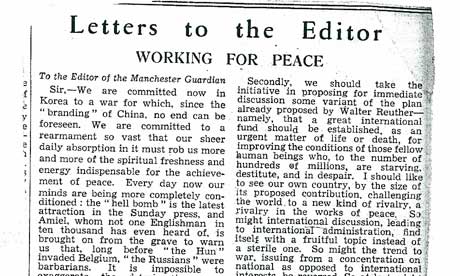Friday 11 February 2011 19.15 GMT
- Article history

Exactly 60 years after a letter to the Guardian calling for an end to war and militarism, a letter that led to the formation of the charity War on Want, the Guardian is publishing a new letter from the organisation, this time demanding the withdrawal of British troops from Afghanistan.
The original correspondence, from the publisher Victor Gollancz, called for a negotiated settlement to the war in Korea and asked anyone who agreed to send him a postcard with the single word "yes". Within a month, 10,000 people had responded and War on Want was born.
Today's letter, which is signed by trade union leaders, UK and Afghan politicians, artists and celebrities, says Britain is again embroiled in an unwinnable war in Asia and calls on any readers who support the withdrawal of British troops to email "yes" to yes@waronwant.org.
The charity's executive director, John Hilary, said: "The original letter from Gollancz caught the public mood at a time when people were horrified at the Korean war and the escalating arms race … we want to rekindle the same feeling of outrage today …"
War on Want has published a report to coincide with the letter that highlights the suffering of the Afghan people. It argues that Afghanistan has endured decades of foreign intervention: as a result, it is one of the world's poorest countries – life expectancy is only 44 years.
It also argues that much of US and British aid has been "militarised", serving security interests rather than those of ordinary people. "US and British forces are engaged in a dirty war," said Hilary. "Using aerial bombing, drone attacks, torture prisons and corporate mercenaries against the Afghan people.
"Development aid is being abused in order to pursue military goals and to privatise the Afghan economy. The government must withdraw troops now and support a political solution under UN auspices … "
Among the signatories is longtime activist and peace campaigner Bruce Kent, now 81, who joined War on Want in the 1960s and was its chair in the 1970s. He praised the charity for its radical campaigning role over the past 60 years.
"War on Want has never been afraid of attacking the symptoms of injustice and making them its priority," said Kent. "It has always been willing to take a stand and make clear that war and militarism cannot be treated as a separate issue by any NGO [non-governmental organisation] dealing seriously with poverty."
The letter also argues that military action in Afghanistan has not worked.
"The surge in military activity has led not to more security but to greater insecurity, both in Afghanistan itself and in neighbouring Pakistan as well," is says. "Opinion polls consistently show over 70% of British people now support the withdrawal of troops from Afghanistan, either 'immediately' or 'soon'."
Signatories include Len McCluskey, general secretary of Unite, and Mark Serwotka, general secretary of the Public and Commercial Services Union. MPs including Marsha Singh, Jeremy Corbyn and Caroline Lucas have signed, as well as lawyer Michael Mansfield QC and film director Ken Loach.
Gollancz's original letter, published in February 1951, warned readers that Britain was "committed to a rearmament so vast that our sheer daily absorption in it must rob us more and more of the spiritual freshness and energy indispensable for the achievement of peace".
It suggested a two-point programme to end the war in Korea: a conference with Russia and the founding of "a great international fund … as an urgent matter of life or death, for improving the conditions of those fellow human beings who, to the number of hundreds of millions, are starving, destitute and in despair".
Hilary said he hoped today's letter would inspire a new generation.
"Gollancz's call for a simple 'yes' fired the imagination of many thousands who wanted to take action against militarism and global poverty but didn't know how to go about it. He was truly ahead of his time … today people can email us their 'yes' rather than sending in postcards, but the call for justice remains the same."

No comments:
Post a Comment